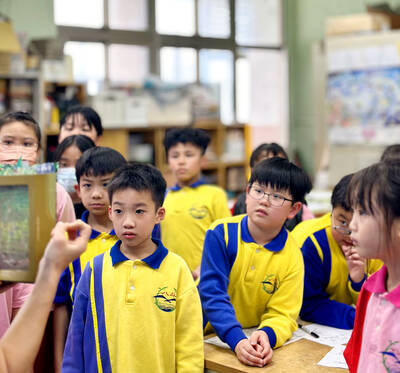The often controversial and sometimes censored Chinese director Zhang Yimou (
The film, which is being screened out of competition for the Golden Bear main prize, makes no direct political comment, although it is about people far down on the ladder of privilege and wealth in China and the dire fate their poverty has in store for them.
Zhang, 50, has previously pulled out of festivals after problems with the Chinese authorities. His film Keep Cool (有話好好說) was kept out of Cannes in 1997 and several of his films have been banned at home.
Zhang was unable to attend the Berlin festival, the Berlinale, as he is in post-production for his next film, Hero (
This year's Berlinale is also screening 13 videos and films from a new generation in China who are using digital equipment to create works that address major social issues such as homelessness, drug addiction, unemployment and the consequences of the "science-fiction-like urbanization of this vast empire," the Berlinale organizers said in an article on their web site.
The motto of the program is "electric shadows," the literal translation of the Chinese word for film, the organizers said.
They described the term as perfectly characterizing "the passionate, committed and surprising emergence of a new generation of young independent filmmakers in the shadow of the official Chinese system." The way for such independence has been cleared by pioneers like Zhang.
And he is still innovating. Zhang, known for tragedies like Raise the Red Lantern (大紅燈龍高高掛), Ju Dou (菊豆) and To Live (活著), is experimenting with black humor in Happy Times.
It tells the touching, often humorous story, of a laid-off, 50-year-old factory worker Old Zhao, played by Zhao Benshan who, in trying to find a wife, ends up forming a deep, sincere parental-like relationiship with his fiancee's blind step-daughter, Wu Ying, a fragile, beautiful 18-year old played by Dong Jie (
Zhao and Dong have also cancelled their appearances at the Berlinale. Zhang said in notes for Happy Times distributed here that he was trying in the film "to pack tragic content with the shell of a comedy and have the audience experience pain following laughter. From an artistic standpoint, it's the highest level of drama."
Old Zhao is trying to marry a fat woman, a divorcee (Dong Lifan) who is only interested in money. Since he is poor, he has to pretend he owns a hotel, but it is merely a trailer in a park where he lets young lovers have some time alone.
The woman tells him to take her blind step-daughter away to work in the hotel as a masseuse but when he arrives with the girl at the park, the trailer is being towed away by police.
So Old Zhao and his friends set up a phony massage parlor in an empty warehouse and take turns getting massages and tipping Wu Ying generously.
The young girl is aware of their trick, but says nothing as she loves them for trying to help her.
Sadly, as their money runs out, the dire fate that poverty brings begins to close in.

May 26 to June 1 When the Qing Dynasty first took control over many parts of Taiwan in 1684, it roughly continued the Kingdom of Tungning’s administrative borders (see below), setting up one prefecture and three counties. The actual area of control covered today’s Chiayi, Tainan and Kaohsiung. The administrative center was in Taiwan Prefecture, in today’s Tainan. But as Han settlement expanded and due to rebellions and other international incidents, the administrative units became more complex. By the time Taiwan became a province of the Qing in 1887, there were three prefectures, eleven counties, three subprefectures and one directly-administered prefecture, with

It’s an enormous dome of colorful glass, something between the Sistine Chapel and a Marc Chagall fresco. And yet, it’s just a subway station. Formosa Boulevard is the heart of Kaohsiung’s mass transit system. In metro terms, it’s modest: the only transfer station in a network with just two lines. But it’s a landmark nonetheless: a civic space that serves as much more than a point of transit. On a hot Sunday, the corridors and vast halls are filled with a market selling everything from second-hand clothes to toys and house decorations. It’s just one of the many events the station hosts,

Two moves show Taichung Mayor Lu Shiow-yen (盧秀燕) is gunning for Chinese Nationalist Party (KMT) party chair and the 2028 presidential election. Technically, these are not yet “officially” official, but by the rules of Taiwan politics, she is now on the dance floor. Earlier this month Lu confirmed in an interview in Japan’s Nikkei that she was considering running for KMT chair. This is not new news, but according to reports from her camp she previously was still considering the case for and against running. By choosing a respected, international news outlet, she declared it to the world. While the outside world

Through art and storytelling, La Benida Hui empowers children to become environmental heroes, using everything from SpongeBob to microorganisms to reimagine their relationship with nature. “I tell the students that they have superpowers. It needs to be emphasized that their choices can make a difference,” says Hui, an environmental artist and education specialist. For her second year as Badou Elementary’s artist in residence, Hui leads creative lessons on environmental protection, where students reflect on their relationship with nature and transform beach waste into artworks. Standing in lush green hills overlooking the ocean with land extending into the intertidal zone, the school in Keelung